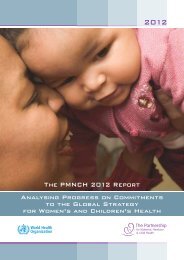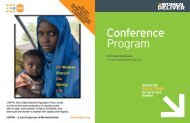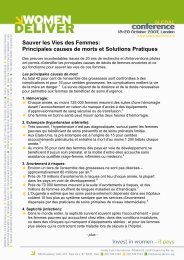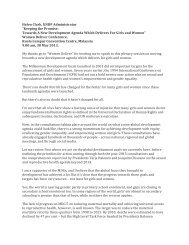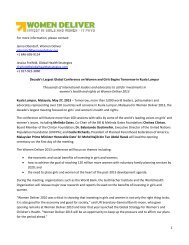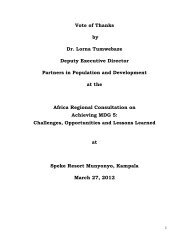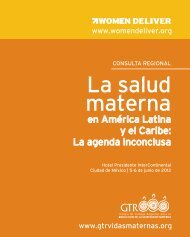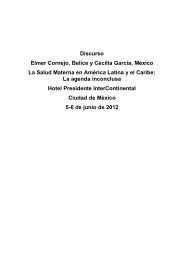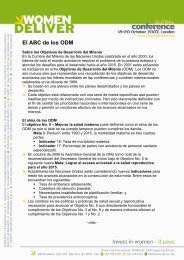State of World Population 2012 - UNFPA Haiti
State of World Population 2012 - UNFPA Haiti
State of World Population 2012 - UNFPA Haiti
You also want an ePaper? Increase the reach of your titles
YUMPU automatically turns print PDFs into web optimized ePapers that Google loves.
messages were delivered via a number <strong>of</strong> routes)turned out to be more effective than a broaderapproach to gender inequality. Men’s involvementin discussions was key, as was the endorsement <strong>of</strong>influential members <strong>of</strong> the community.If more traditional, dominant male genderattitudes are related to poorer health outcomes,it is logical that more gender equitable attitudescan lead to improvements in sexual and reproductivehealth-related attitudes and practices(Pulerwitz and Barker 2006; Barker, Ricardo andNascimento, 2007). The International Men andGender Equality Survey, for example, has shownmore healthful practices to be associated withhigher scores on the “gender equitable man” orGEM Scale for measuring attitudes towards genderequality (International Center for Research onWomen and Promundo, 2010).What these data tell us is that men with morerespectful attitudes are likely to have betterindividual and couple outcomes as reflected inimproved couple communication, more sexualsatisfaction, greater chances <strong>of</strong> accompanying theirfemale partners to antenatal visits, and greaterlikelihood <strong>of</strong> having sought an HIV test.In the past 15 years, non-governmentalorganizations, United Nations agencies andgovernments have invested in programmes thatbring together efforts to change gender normswith health interventions. Recent research hasshown that efforts to strengthen more genderequitable attitudes among men can influence sexualand reproductive health-related attitudes andpractices (Pulerwitz and Barker, 2006; Barker,Ricardo and Nascimento, 2007). Recent globalreviews <strong>of</strong> sexual and reproductive health programmeshave found that those that integratedgender considerations achieved better outcomes(Rottach, Schuler and Hardee, 2011; Barker,Ricardo and Nascimento, 2007).Prevention <strong>of</strong> mother-to-childtransmission <strong>of</strong> HIV/AIDSOlivia Adelaide,lab technician atMozambique's BoaneHealth Center, which<strong>of</strong>fers primary care andsexual and reproductivehealth services, includingfamily planning andHIV testing.©<strong>UNFPA</strong>/Pedro Sá daBandeiraHIV status does not necessarily repress the desire to have children,and HIV-positive women may decide to have children in spite <strong>of</strong> theirHIV status, or they may decide not to have children (Rutenberg et al.,2006). Women living with HIV are unable to exercise their right todecide the number, timing and spacing <strong>of</strong> their children when discriminatorypractices deprive these women <strong>of</strong> the necessary means andservices to fulfil their decisions, such as accessing contraception, familyplanning, maternal health care, and drugs and services to preventmother-to-child transmission.The right to health and the right to sexual and reproductive health entitlewomen living with HIV to the treatment, care and services necessaryfor them to prevent mother-to-child transmission when they are pregnant.The risk <strong>of</strong> perinatal transmission <strong>of</strong> HIV is below 2 per cent whencoupled with antiretroviral treatments, safe delivery and safe infantfeeding. Absent these critical services, the risk ranges from 20 per centto 45 per cent (<strong>World</strong> Health Organization, 2004a).In low- and middle-income countries, an estimated 45 per cent<strong>of</strong> HIV-positive pregnant women receive at least some antiretroviraldrugs to prevent mother-to-child transmission <strong>of</strong> HIV (<strong>World</strong> HealthOrganization, UNAIDS and UNICEF, 2010).tTHE STATE OF WORLD POPULATION <strong>2012</strong>43




